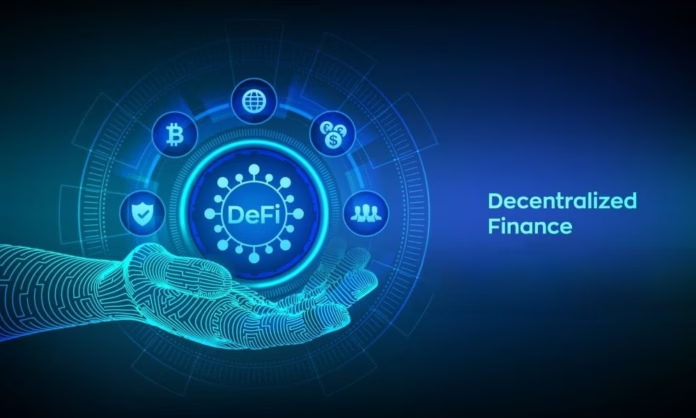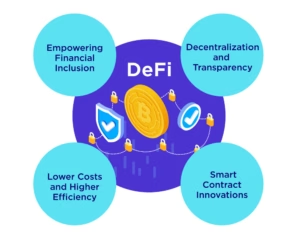Decentralized Finance (DeFi) is reshaping the financial world as we know it. A paradigm shift in the financial industry is represented by Decentralized Finance. The shift from traditional finance to DeFi is more than a trend; it is a revolution that has the potential to redefine how we interact with money, investments, and banking.
What Is Decentralized Finance?
Fundamentally, blockchain-based financial services are referred to as Decentralized Finance (DeFi). Unlike traditional financial institutions, DeFi applications operate through smart contracts, allowing users to borrow, lend, trade, and invest without relying on banks or centralized authorities. These platforms often use cryptocurrencies and are accessible to anyone with an internet connection, offering global financial inclusion.
Most DeFi initiatives are hosted on blockchain networks like Ethereum, which are essential to DeFi. By using decentralized networks, DeFi eliminates the need for middlemen, reducing costs and increasing efficiency. Technology also ensures that transactions are secure, immutable, and transparent.
How DeFi Is Revolutionizing Finance
- Empowering Financial Inclusion
Traditional banking systems exclude billions of people worldwide due to geographical, economic, or bureaucratic barriers. Decentralized Finance provides a solution by offering financial services to anyone with a smartphone and internet access. This inclusivity allows unbanked populations to save, invest, and transact without facing discrimination or excessive fees.
- Decentralization and Transparency
DeFi functions on a decentralized blockchain, in contrast to traditional finance, which depends on opaque processes and centralized control. Every transaction is documented on a public ledger to guarantee total transparency. Independent transaction verification by users lowers the possibility of fraud and corruption.
3. Lower Costs and Higher Efficiency
Traditional financial systems often involve intermediaries, from banks to payment processors, which increase costs and processing times. DeFi reduces the cost and speed of transactions by eliminating these middlemen. For instance, users can transfer funds or access loans within minutes, regardless of their location.
- Smart Contract Innovations
Smart contracts form the backbone of DeFi. These self-executing contracts automatically enforce the terms of an agreement, reducing the need for third-party oversight. They are particularly valuable in lending platforms, where borrowers can secure loans without lengthy approval processes or credit checks.
Use Cases of Decentralized Finance
DeFi is not just a concept; it’s actively transforming various financial services. Here are some key applications:
- Lending and Borrowing: Platforms like Aave and Compound enable users to lend their assets and earn interest or borrow funds by providing collateral. The process is faster and more flexible than traditional banking.
- Decentralized Exchanges (DEXs): Uniswap and SushiSwap allow users to trade cryptocurrencies directly without relying on centralized exchanges, reducing risks of hacking and manipulation.
- Stablecoins: DeFi has introduced stablecoins, cryptocurrencies pegged to traditional currencies like the USD, ensuring price stability and usability in daily transactions.
- Yield Farming and Staking: Users can earn passive income by providing liquidity to DeFi platforms or staking their assets to secure the network.
- Tokenized Assets: DeFi allows traditional assets, such as real estate or stocks, to be tokenized and traded on blockchain networks, increasing accessibility and liquidity.
Challenges Facing Decentralized Finance
Despite its promise, Decentralized Finance faces significant challenges. Security vulnerabilities are a major concern, as hackers frequently target DeFi platforms. Additionally, regulatory uncertainty looms large, with governments worldwide struggling to adapt laws to this new financial model. The complexity of DeFi platforms is another hurdle. For widespread adoption, user-friendly interfaces and educational resources are essential to help individuals understand and trust these systems.
The Future of Finance with DeFi
The impact of Decentralized Finance on the future of finance cannot be overstated. As technology evolves and adoption grows, DeFi has the potential to disrupt traditional banking, democratize investments, and create a more equitable financial system.
While challenges like regulation and security remain, the industry is rapidly innovating to address these issues. With ongoing advancements, Decentralized Finance could become the foundation of a truly decentralized and global economy.
Conclusion
A paradigm shift in the financial industry is represented by Decentralized Finance. By leveraging blockchain technology and eliminating intermediaries, DeFi is creating a more transparent, inclusive, and efficient financial system. Though challenges persist, the opportunities it offers are immense, paving the way for a revolutionary future in finance.
Recommended For You:
Future of AI in Banking and Finance
How can Robotic Process Automation (RPA) Help in Finance Sector?


